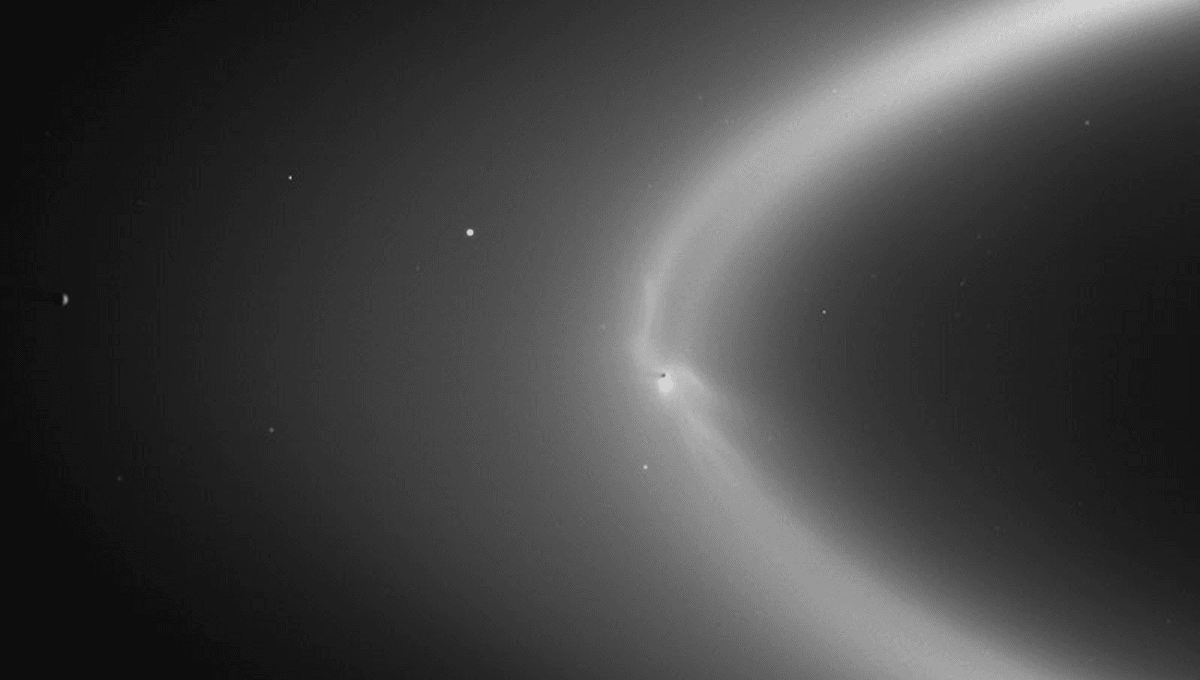
If you care about the search for life elsewhere in the Solar System and are not already on board the Enceladus bandwagon, now might be a great time to join. Already described as having “all the elements necessary for life,” the little moon has now been shown to have one of the utmost importance in very high concentrations.
Last year, the JWST viewed a plume from the geysers of Enceladus, revealing its immense size and a little of its composition. Soon it will take a longer look, but it seems we’re not dependent on what it finds to learn about the moon – there’s still treasure buried in the data collected by the Cassini spacecraft six or more years ago.
Cassini was not equipped with many of the instruments we would have sent it with, had we known what it would find out about Enceladus. Nevertheless, its Cosmic Dust Analyzer has turned out to be capable of one of the most important tasks we could have assigned: not only detecting phosphorus in the plume, but revealing its abundance.
Last year a study predicted phosphates would be present in the internal ocean underneath Enceladus’ icy core. However, this was theoretical modeling, showing that conditions at the boundary between its rocky core and the oceans above were suitable to release phosphorus in the form of orthophosphate (PO43-) – not observations.
Skeptics could easily question the paper’s assumptions: what if some previous process had depleted the core of phosphorus? Could the authors really be so sure of conditions such as acidity deep within this strange moon?
Now it turns out there is no need to assume.
Cassini was able to sample Saturn’s E ring, much of which is formed from ice grains spat out of Enceladus’s oceans through its geysers, and run them through a mass spectrometer. Previous analysis revealed ions of sodium, potassium, chlorine, and carbonates. A team led by Professor Frank Postberg of the Freie Universität Berlin re-examined the mass and found spikes matching the mass of sodium phosphates.
Not only were the phosphates present in what Cassini collected, the authors claim that “phosphorus concentrations [are] at least 100-fold higher in the moon’s plume-forming ocean waters than in Earth’s oceans.” They acknowledge concentrations vary greatly from grain to grain, but don’t know if these reflect localization within the ocean, or some separation process during escape.
The phosphate abundance may indicate something even more significant, although this is speculative. Phosphates tend to be rare in calcium-rich waters, as calcium phosphates have low solubility. In an accompanying News & Views, Dr Mikhail Yu. Zolotov of Arizona State University notes if Enceladus’s ocean lacks calcium ions it could be because they are trapped in organic complexes, an even stronger sign of life.
With the exception of some rare bacteria, all life on Earth needs phosphorus. Phosphate ions in fertilizer are so crucial to agriculture that the discovery of new sources has staved off widespread famines several times. Perhaps life could find a way without access to phosphates, but this evidence suggests on Enceladus it might truly thrive.
This is a good sign not just for Enceladus, but for other moons with similar structures of solid cores surrounded by liquid oceans and icy crusts. In that context the JUICE mission, now on the way to Jupiter, and the soon-to-be-launched Europa Clipper may have exciting news for us come 2030. Nevertheless, surely this can only increase the pressure for a similar mission to sample the spray from Enceladus’ geysers with the capacity to search it for living cells.
The study is published in Nature, along with the accompanying News & Views article.
Source Link: Phosphates, Essential For Life, Are Abundant In The Oceans Of Enceladus